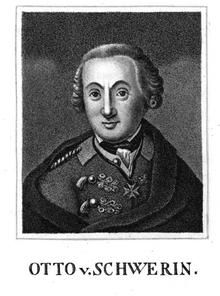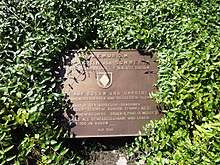Otto Magnus von Schwerin
Otto Magnus (Martin) von Schwerin (21 June 1701 - 14 August 1777) was a Prussian general in the army of Frederick the Great.
Otto Magnus von Schwerin | |
|---|---|
 | |
| Born | June 21, 1701 Halberstadt, Germany |
| Died | August 14, 1777 (aged 76) Budzów, Opole Voivodeship, Germany |
His parents were the Prussian colonel Johann Georg (Hans Jürgen) von Schwerin (* 3 May 1668: † 5 June 1712) and Maria Esther von Dockum. His mother was the daughter of Martin Arnd von Dockum from the Duchy of Geldern and the Magdalena Esther of Loë of Oldenpiel. His brother Frederick Leopold (1699–1750) was also a Prussian general.
Military career

As a 13-year-old boy (1714), he entered the Prussian military service on the horse guard "Crown Prince". At the beginning of the First Silesian War Schwerin was already Lieutenant-Colonel and Commander of the "Markgräflich Bayreutschen Dragoonsregiment". Both his regiment and himself, however, did not gain any laurels in the battles at Mollwitz in 1741 and Chotusitz in 1742: the latter was particularly painful, when his regiment was dispersed by the enemy cavalry before the advance. In addition, he was seriously wounded and captured by the Austrians. Frederick the Great then decreed the royal disgrace of his cavalry.
Returning to his garrison town Pasewalk after the peace, Schwerin devoted himself with zeal to the intense training of his regiment. Frederick II was very satisfied with his work and ordered the commanders of the three East Prussian Dragoon regiments to go to Pasewalk and learn from Schwerin.
Schwerin's fame came on 4 June 1745, in the Battle of Hohenfriedberg, by the famous charge of his regiment Bayreuth under Gessler and his leadership. After the battle Frederick the Great said to him, "Schwerin, such a deed as this day is not to be found in all the Roman history," and rewarded Schwerin with the promotion to major general and the award of the Order Pour le Mérite. Later, Schwerin also got the main administrative teams to Stettin and Fischhausen, which earned 10,000 thaler annual income.
With King Schwerin's peace, King Friedrich was less satisfied, for the general soon became acquainted with his officers, and Frederick exhorted him "to drink from drinking," but without success. In 1755, during the autumn maneuver at Stargard, Schwerin received such a sharp reprimand from the king, "A mischief that pulls him once more." He then withdrew to his estates in Pomerania and asked for leave, which however was not granted. After a year, the Seven Years' War broke out and Frederick urged Schwerin to resume the command of his regiment, which the General did. In 1756, Schwerin was promoted to lieutenant-general, and distinguished himself again in the battle of Lobositz (October 1, 1756), but he took leave in 1757. On account of his conflict with Frederick II, he was never raised to the rank of count, and a simple Herr von Schwerin remained.
| Wikimedia Commons has media related to Schwerin family. |